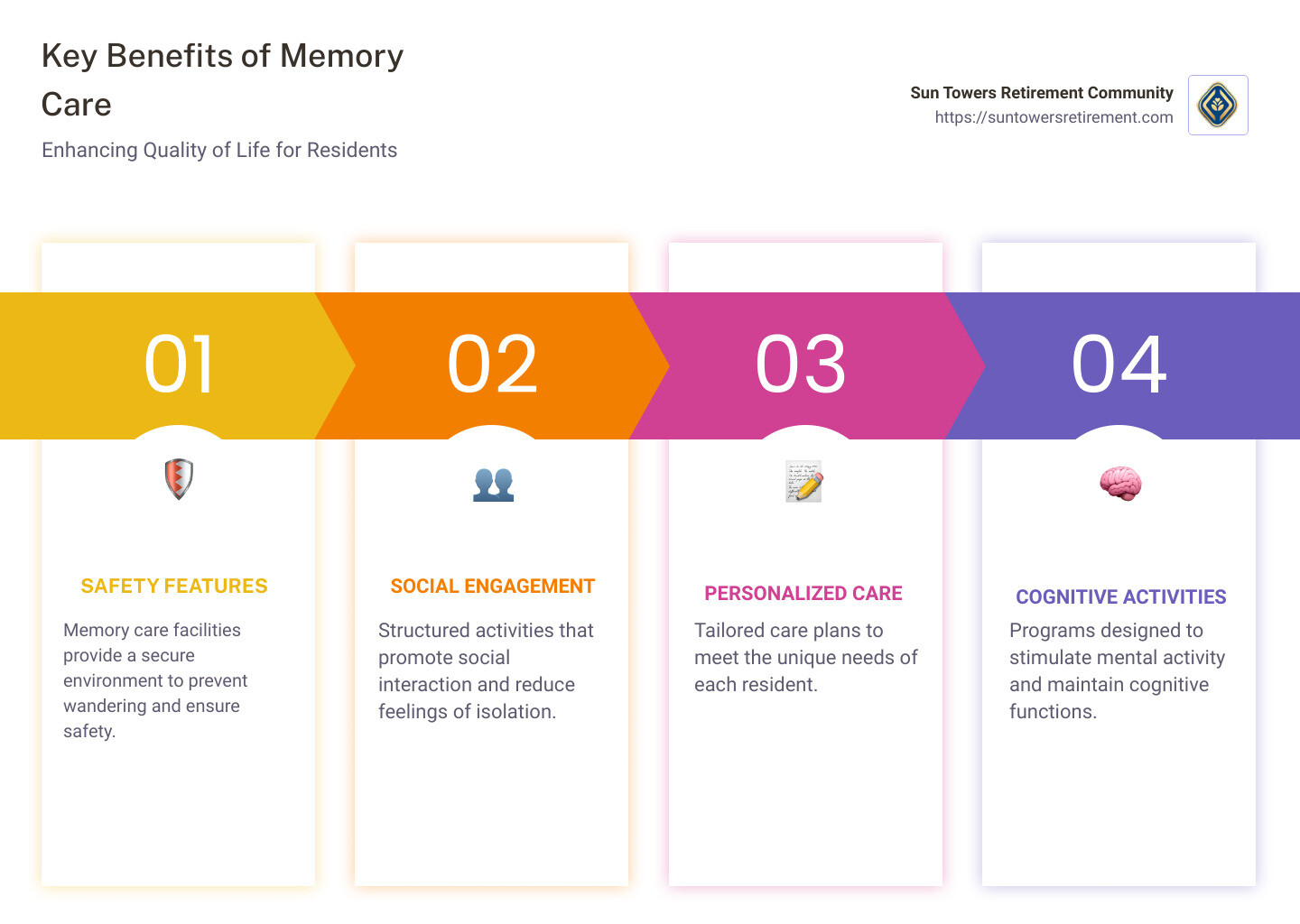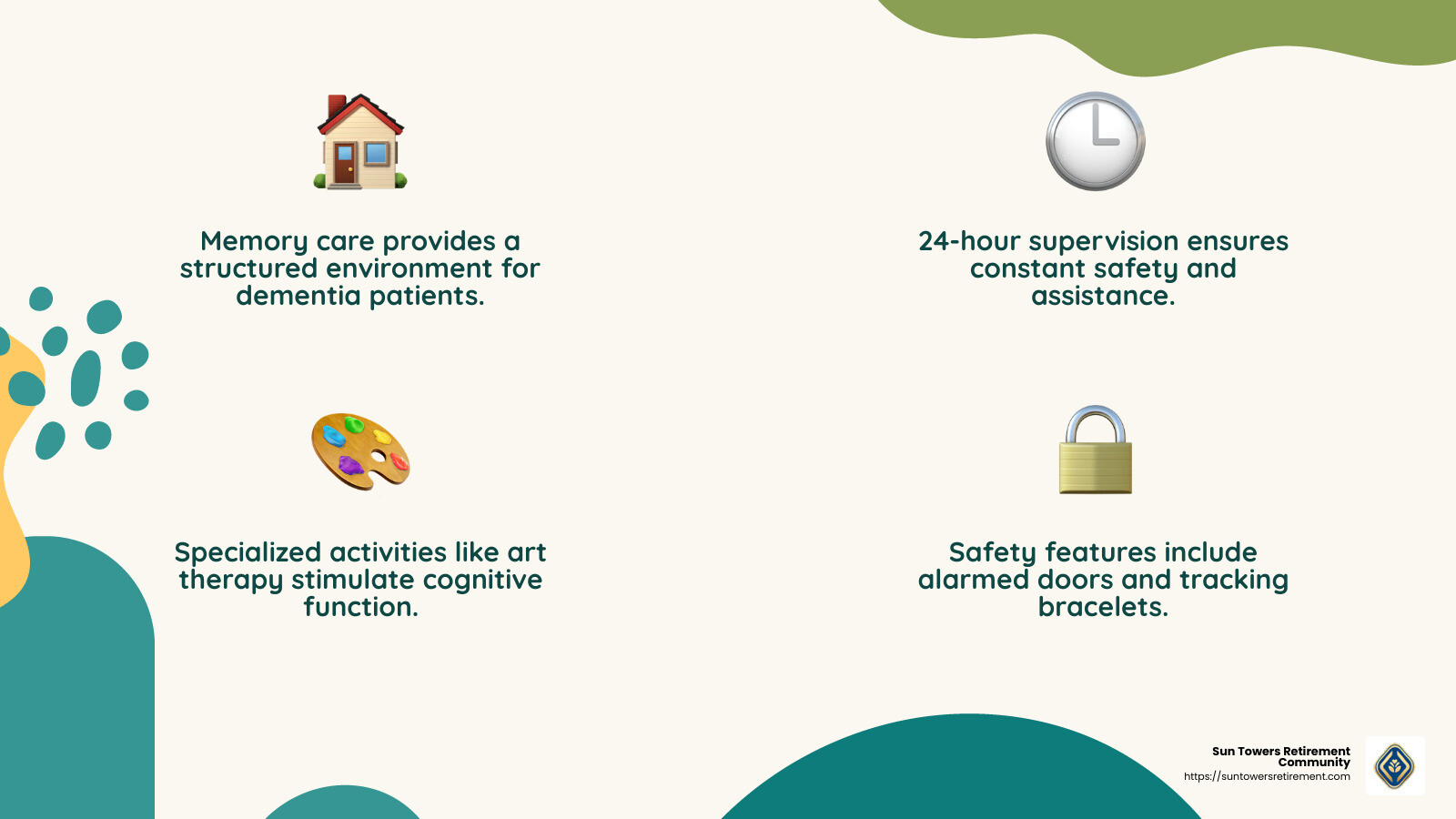Memory Care: Top 7 Crucial Facts to Know in 2024
Memory care is a specialized form of care designed for those living with dementia and Alzheimer’s disease. It’s aimed at providing a safe and supportive environment where individuals receive personalized attention. If you’re exploring options for a loved one or yourself, understanding the essentials of memory care is crucial.
Quick Facts:
– What it is: Specialized residential care for dementia and Alzheimer’s patients.
– Purpose: To offer a safe, structured environment with 24-hour supervision.
– Benefits: Improved safety, social interaction, and a focus on cognitive support.
The journey through dementia and Alzheimer’s can be challenging, both for individuals and their families. Memory care facilities provide the necessary structure and support to improve quality of life for those experiencing memory loss. These facilities often feature specialized staff and environments designed to engage residents in meaningful activities, which are important for cognitive health and emotional well-being.
Finding the right memory care community means prioritizing compassionate care and a warm atmosphere that fosters independence while ensuring safety. Having access to such custom support services can not only meet the physical needs of residents but also provide essential social and emotional support.
What is Memory Care?
Memory care is a type of residential care specifically for individuals with Alzheimer’s disease and other forms of dementia. It’s more than just a place to live—it’s a structured environment aimed at enhancing the quality of life for its residents.
24-Hour Supervision
One of the key features of memory care is 24-hour supervision. This means trained staff are always available to assist residents, ensuring their safety and addressing any immediate needs. This constant care is crucial because individuals with memory issues can sometimes wander or experience confusion, posing risks to their safety.
Structured Environment
A structured environment is another hallmark of memory care. These facilities are designed to reduce stress and confusion for residents. They offer a routine that helps individuals feel more secure and comfortable. From meal times to activities, every aspect is planned to create a predictable and calming atmosphere.
Specialized Activities
Activities in memory care are not just about keeping busy. They are carefully designed to stimulate cognitive function and engage residents at various stages of their disease. For example, art and music therapy can be particularly beneficial, as they tap into areas of the brain less affected by dementia.
Safety Features
Safety is a top priority in memory care communities. Facilities often have features like alarmed doors and coded elevators to prevent wandering. Some even offer tracking bracelets, allowing residents to explore safely while staff monitor their location.
Choosing a memory care facility is about more than finding a place to live—it’s about ensuring a supportive environment that caters to the unique needs of those with memory loss. This makes it a crucial step for families seeking the best care for their loved ones.
Signs It’s Time for Memory Care
Deciding when to move a loved one into memory care can be challenging. However, certain signs can indicate that it’s time to consider this transition. Let’s explore some of the key indicators.
Behavior Changes
One of the first signs that memory care might be necessary is noticeable behavior changes. Individuals with Alzheimer’s or dementia may exhibit increased confusion, aggression, or anxiety. They might forget familiar people or places, leading to frustration. Such changes can disrupt daily life and indicate the need for specialized care.
Safety Concerns
Safety becomes a major concern as memory issues progress. For example, individuals may wander from home or forget to turn off appliances, posing risks to themselves and others. Memory care facilities are designed with safety in mind, featuring alarmed doors and secure outdoor spaces to prevent wandering. These measures ensure that residents can explore their surroundings safely.
Caregiver Stress
Caring for someone with dementia can be emotionally and physically exhausting. Caregiver stress is a significant factor in deciding to transition to memory care. When caregivers feel overwhelmed or unable to meet the demands of daily care, it’s time to seek additional support. Memory care facilities provide 24-hour supervision, allowing caregivers to focus on their well-being while ensuring their loved ones receive the care they need.
Recognizing these signs can help families make informed decisions about transitioning to memory care. It’s about finding the right balance between independence and safety for your loved one.
Memory Care vs. Assisted Living
Choosing between memory care and assisted living can be confusing. Both offer valuable services, but they cater to different needs. Let’s break down the key differences in terms of specialized staff, cost, and care levels.
Specialized Staff
Memory care facilities are equipped with specially trained staff who understand the unique challenges of dementia and Alzheimer’s. These caregivers are skilled in managing symptoms like confusion and aggression. They also know how to engage residents in activities that improve cognitive function, such as art and music therapy.
In contrast, assisted living staff provide general support for daily activities like bathing, dressing, and medication management. While they are compassionate and capable, they may not have the specialized training needed to address complex memory issues.
Cost Differences
The cost of memory care tends to be higher than that of assisted living. This is due to the specialized care and security features offered. In Las Vegas, for example, the average cost of memory care is around $4,899 per month, with prices ranging from $1,800 to $8,700.
Assisted living is generally more affordable, as it provides a lower level of care. However, the costs can add up if additional services are required. It’s important to weigh the long-term benefits and potential needs when considering the financial aspect.
Care Levels
Memory care provides a structured environment with 24-hour supervision. This constant oversight ensures residents’ safety and supports their daily routines, reducing stress and confusion. Facilities often have secure outdoor spaces and alarmed doors to prevent wandering, which is a common concern for dementia patients.
Assisted living offers more independence. Residents have access to care when needed but can maintain a level of autonomy. This option is ideal for seniors who need help with daily tasks but do not require constant supervision.
In summary, the choice between memory care and assisted living depends on the specific needs of your loved one. If they require specialized attention and a secure environment, memory care might be the best fit. For those who value independence and need moderate assistance, assisted living could be the right choice.
Memory Care Costs and Financial Assistance
Planning for memory care can be overwhelming, especially when considering the costs involved. Let’s explore the current cost trends, available financial aid, and tips for planning ahead.
Cost Trends
Memory care costs have been rising steadily. In Florida, where Sun Towers Retirement Community is located, the cost increased by 10.5% from 2022 to 2023, climbing from $6,435 to $7,104 per month. This trend is consistent with the national average increase, reflecting broader economic factors like inflation. Looking ahead to 2024, prices are expected to rise again, reaching an estimated $7,664 per month in Florida. These costs are higher than other senior care options due to the specialized services and staff required.
Financial Aid
Not everyone can afford to pay for memory care out-of-pocket. Fortunately, there are financial assistance options available:
-
Medicaid: Depending on the state, Medicaid may cover some memory care costs. It’s crucial to check eligibility requirements and coverage specifics in Florida.
-
Veterans Benefits: Veterans and their spouses may qualify for Aid and Attendance benefits, which can help cover memory care expenses.
-
Long-term Care Insurance: If your loved one has a long-term care insurance policy, review it to understand what memory care costs are covered.
-
Nonprofit Organizations: Various nonprofits offer grants or financial aid to families in need of memory care support.
Planning for the Future
Given the rising costs, it’s wise to plan for future expenses:
-
Start Early: Begin researching and budgeting for memory care as soon as possible. This allows you to explore different facilities and financial aid options.
-
Consider Shared Living Arrangements: Some facilities offer shared accommodations, which can be a more cost-effective option.
-
Reassess Regularly: As circumstances change, such as health or financial status, reassess your financial plan to ensure it aligns with your loved one’s needs.
By understanding these cost trends and financial aid options, families can make informed decisions about memory care while minimizing financial stress.
Frequently Asked Questions about Memory Care
What is the difference between memory care and dementia care?
Memory care and dementia care are often used interchangeably, but they have distinct features. Memory care is a specialized type of care offered in dedicated facilities or units within larger communities, focusing on residents with Alzheimer’s and other forms of dementia. These facilities are designed with safety features, like alarmed doors and enclosed outdoor spaces, to prevent wandering—a common concern for those with dementia.
In contrast, dementia care can refer to any care provided to individuals with dementia, whether at home or in a facility. It doesn’t necessarily require a specific diagnosis to begin, whereas memory care often involves a formal diagnosis of Alzheimer’s or another cognitive impairment.
Do dementia patients do better at home or in a nursing home?
Choosing between home care and a nursing home for a loved one with dementia depends on several factors. At home, the familiar environment can be comforting, but it may also present safety hazards if the home isn’t adequately modified. Caregiver stress is another concern, as providing 24-hour supervision can be overwhelming.
On the other hand, nursing homes, especially those with memory care units, offer a structured environment with specialized staff trained to handle the unique challenges of dementia. Facilities like Sun Towers Retirement Community provide individualized care and enriching activities that can improve residents’ quality of life. The decision should consider the individual’s specific needs, safety, and well-being.
How can I make memory care more affordable?
Memory care can be costly, but several strategies can help make it more affordable:
-
Financial Assistance: Explore options like Medicaid, which may cover some costs depending on your state. Veterans may be eligible for Aid and Attendance benefits, which can also help with expenses.
-
Alternative Methods: Consider shared living arrangements within a facility, which can reduce costs. Some facilities offer shared rooms or suites, making them more budget-friendly.
-
Nonprofit Support: Look for nonprofit organizations that provide financial aid or grants to families needing memory care.
-
Long-term Care Insurance: If available, review the policy to understand what costs are covered. This can significantly offset expenses.
By utilizing these resources and planning ahead, families can find ways to afford the necessary care for their loved ones while ensuring they receive the best possible support.
Conclusion
At Sun Towers Retirement Community, we understand the importance of providing a comprehensive continuum of care for our residents. Our goal is to ensure that each individual can “age in place,” meaning they have access to the appropriate level of care without needing to move to a different facility. This approach not only improves the quality of life for our residents but also offers peace of mind to their families.
Our community offers a range of services, including Independent Living, Assisted Living, Memory Care, and Skilled Nursing. This variety allows us to cater to the evolving needs of our residents, ensuring they receive the right support at every stage of their journey. Our specialized memory care program is designed to provide a safe and nurturing environment for those living with Alzheimer’s and other forms of dementia. With compassionate staff and engaging activities, residents can enjoy a fulfilling life while receiving the care they need.
Choosing the right care for a loved one is a significant decision, and we’re here to support you every step of the way. If you’re considering memory care for a family member, we invite you to explore the options available at Sun Towers Retirement Community. Our team is dedicated to providing exceptional care and ensuring a smooth transition for our residents and their families.
For more information on our memory care services and how we can help your loved one thrive, visit our Memory Care Services page. We look forward to welcoming you to our community and supporting your family on this journey.




















